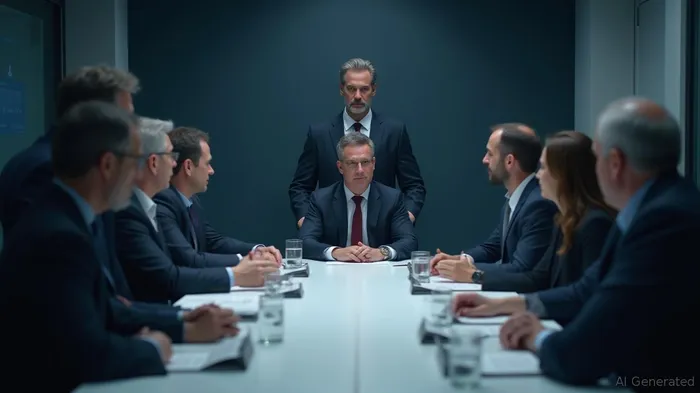Microsoft, OpenAI Clash Over AGI Clause in 10 Billion Deal
Microsoft and OpenAI, once close allies, are now locked in a heated dispute over the definition and control of Artificial General Intelligence (AGI). The conflict centers around a key clause in their 2019 agreement, which allows OpenAI to terminate Microsoft's access to its technology upon achieving AGI. This clause has become a major point of contention, with MicrosoftMSFT-- pushing to remove it from the contract. The disagreement highlights the strategic importance of AGI, which represents a significant leap in AI capabilities, potentially surpassing human intelligence. The tension between the two companies underscores the broader competition in the AI sector, where control over advanced AI technologies is crucial for maintaining a competitive edge. The dispute also reflects the challenges in defining and regulating AGI, as its development could have profound implications for various industries and society as a whole.
According to a recent in-depth investigation, the 2023 10 billion cooperation agreement between OpenAI and Microsoft has hit a major roadblock due to the "Artificial General Intelligence (AGI)" clause. Microsoft has demanded the removal of a crucial clause that allows OpenAI to terminate technology licensing upon achieving AGI. However, negotiations have stalled as of May 2025, potentially jeopardizing OpenAI's plans for its largest-ever Initial Public Offering (IPO).
The core of the contract dispute lies in the 'termination of technology licensing clause.' According to the original 2019 agreement, OpenAI's non-profit board has the authority to determine when AI has evolved into AGI, at which point OpenAI can immediately cut off Microsoft's access to the technology. Initially, this clause was seen as a far-fetched idea by Microsoft's executives, who viewed it as a naive fantasy of techno-utopianism. However, the rapid development of AI has changed the landscape dramatically in just a few years. OpenAI's CEO has publicly claimed that AGI is "just around the corner" and has defined it as a system capable of solving complex human-level problems across multiple domains. In contrast, Microsoft's CEO has dismissed this claim, stating that a 10% annual growth in the global economy is a more realistic benchmark, and privately judging that AGI is unlikely to be achieved before the contract expires in 2030.
Over the past three years, Microsoft has leveraged OpenAI's AI technology to launch a series of new software tools, such as Copilot. If not constrained by the 'termination of technology licensing clause,' Microsoft could continue to use this technology until 2030, as per the financial support terms in the agreement. For Microsoft's products in the competition with other tech giants, obtaining the latest technology from OpenAI is crucial. As OpenAI's technological improvements and business successes have become more apparent in the past two years, sometimes even at the expense of Microsoft, Microsoft's concern about maintaining access rights has grown. A potential solution to break the deadlock has been proposed. According to a source close to the negotiations, the two companies are considering replacing the AGI benchmark with another technology, commonly referred to as Artificial Superintelligence, which has greater profit potential and the ability to change the world. This would push the goal further into the future while still ensuring that Microsoft will eventually lose access to OpenAI's most advanced technology.
Meanwhile, Microsoft has rejected a series of concessions related to the restructuring proposed by OpenAI, including giving up the right to 20% of OpenAI's revenue or allowing customers to access OpenAI models through competing cloud service providers. OpenAI, on the other hand, hopes to exempt high-end products (such as AI with a monthly fee of 20,000 dollars) from revenue sharing. According to financial estimates, if OpenAI achieves its 2030 revenue target of 17.4 billion dollars, the revenue share would exceed Microsoft's annual cloud computing profits. Despite these points of disagreement, sources close to the negotiations say that the two companies' executives continue to meet daily to discuss their contract, with Microsoft's CEO and other executives still believing that an agreement can be reached without a complete breakdown. However, internal forecasts indicate that OpenAI will need to spend 46 billion dollars over the next four years to maintain research and development, making an IPO a matter of survival. The stalemate has set the nerves of Silicon Valley investors on edge. "If the restructuring fails, the special equity structure will make the IPO a pipe dream," admitted a top venture capital partner holding OpenAI shares.
Looking back at the honeymoon period of their 2019 collaboration, Microsoft provided OpenAI with the computational power it needed to survive, while OpenAI's GPT technology helped Microsoft create flagship products like GitHub Copilot. However, the unexpected popularity of ChatGPT at the end of 2022 has fundamentally altered the balance of power. The rift between the two companies is widening, and the future of their partnership remains uncertain. The dispute over AGI highlights the broader competition in the AI sector, where control over advanced AI technologies is crucial for maintaining a competitive edge. The tension between Microsoft and OpenAI underscores the challenges in defining and regulating AGI, as its development could have profound implications for various industries and society as a whole. The outcome of this dispute will have significant implications for the future of AI and the tech industry as a whole. 
Stay ahead with the latest US stock market happenings.
Latest Articles
Stay ahead of the market.
Get curated U.S. market news, insights and key dates delivered to your inbox.

Comments
No comments yet